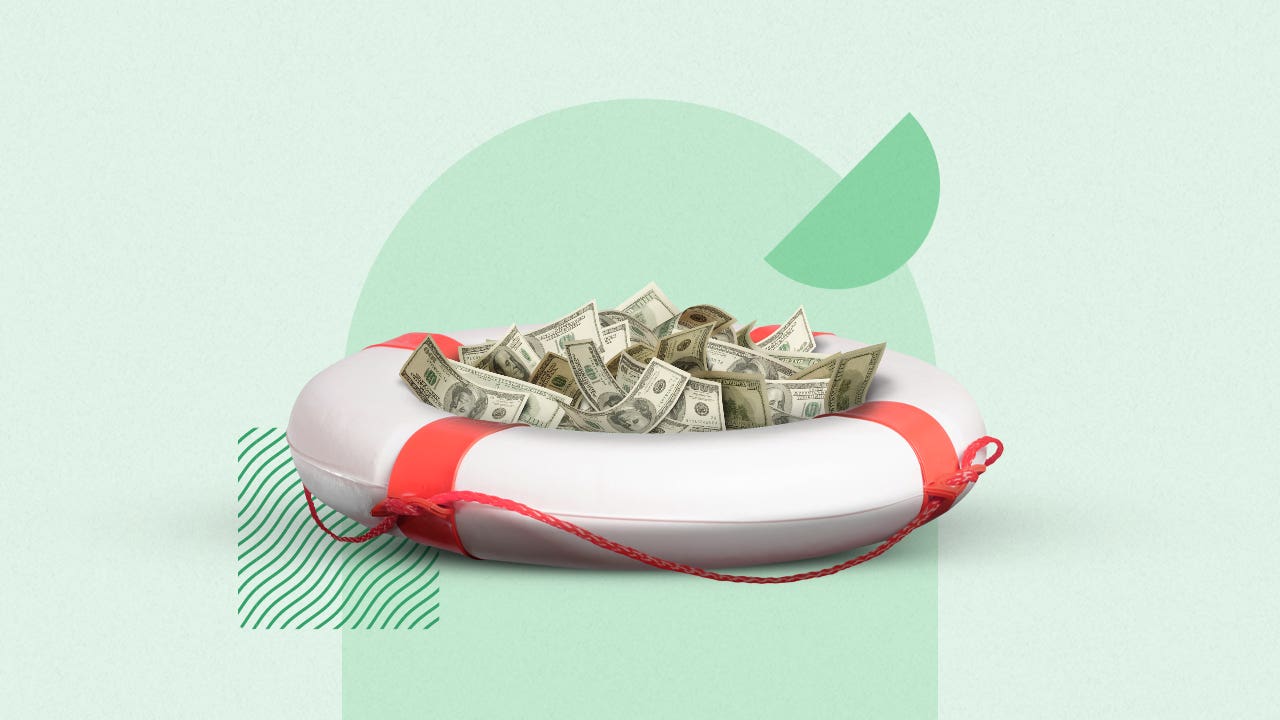
Photos by GettyImages; Illustration by Hunter Newton/Bankrate
When surprising bills come up, having an emergency fund can present peace of thoughts and monetary stability. Nevertheless, Bankrate’s 2024 Annual Emergency Financial savings Report discovered that almost all of U.S. adults (56 %) do not need sufficient emergency financial savings to cowl even three months of bills.
So, how a lot emergency financial savings ought to you will have? For some, following the usual recommendation of three to 6 months of dwelling bills is likely to be enough. Others, nonetheless, might want to avoid wasting kind of than that quantity, relying on elements akin to earnings, value of dwelling and family measurement. That financial savings can go right into a cash market or high-yield financial savings account, the place it might probably develop with curiosity and have some liquidity.
Thus, the reply might fluctuate relying on particular person circumstances, however one factor is evident: having some emergency financial savings is essential. Understanding you will have a security internet may help alleviate some fear, as Bankrate’s Cash and Psychological Well being Survey discovered that 47 % of Individuals say cash negatively impacts their psychological well being, no less than often.
When you’re undecided how a lot to avoid wasting for the surprising, listed here are some situations to think about.
Emergency fund statistics
Bankrate’s 2024 Emergency Financial savings Report discovered that:
- A majority of U.S. adults (59%) are uncomfortable with the extent of emergency financial savings they’ve.
- Solely 16% of U.S. adults have between three and 5 months’ bills saved..
- Roughly 6 in 10 respondents (63%) say they’d want no less than six months of bills saved to really feel comfy..
- Over a 3rd (36%) of individuals have extra bank card debt than emergency financial savings.
- Almost one-third (29%) of Gen Zers (ages 18-26) do not need emergency financial savings — nearly twice as many because the 16% of child boomers (ages 59-77) who haven’t any emergency financial savings. Child boomers are additionally greater than 3 times as prone to have sufficient financial savings to cowl six months or extra of bills as Gen Zers (46% and 11%, respectively).
- Annual earnings additionally significantly elements into how a lot somebody has in emergency financial savings—greater than half of households (56%) incomes over $100,000 yearly are comfy with their emergency financial savings.
How a lot emergency financial savings ought to I’ve?
Private finance is private. What is likely to be proper for one particular person is probably not the best choice for an additional. It’s good to take heed to monetary consultants and perceive why they advocate saving a specific amount, however finally what issues is whether or not you’re comfy along with your emergency financial savings. That would imply two years or two months of emergency financial savings, relying in your objectives. So long as your financial savings doesn’t sabotage different monetary objectives, put aside no matter you want to keep away from worrying about paying for the surprising.
“The extra unstable your earnings is, the extra it is best to in all probability hold in an emergency fund. Additionally, the upper your insurance coverage deductibles are, the extra you need to be retaining in an emergency fund,” says Erik M. Baskin, founding father of Baskin Monetary Planning primarily based in Sugarcreek Township, Ohio. “A household that has two steady incomes and no youngsters wants a lot much less in emergency financial savings than a single earnings family with 4 youngsters.”
When you’re not coated as a lot as you’d like, create a financial savings plan to get you there, even when it means beginning sluggish with $10 to $100 a month. Small financial savings can actually add up.Take a look at your finances and month-to-month earnings to find out how a lot you want for dwelling bills and the way a lot it can save you and spend money on different areas of your life, like emergency financial savings.
To get extra perception on how a lot and what methods to avoid wasting for emergencies, contemplate working with a monetary advisor for customized assist.
When you may want an even bigger emergency fund
Saving a number of months’ value of earnings looks as if a frightening process. One factor to recollect, although, is that constructing an emergency fund means saving as much as cowl fundamental dwelling bills, not changing your whole earnings. So, in case your month-to-month bills add as much as $2,500, you’ll want to avoid wasting $7,500 to achieve three months of emergency financial savings.
There are occasions, nonetheless, once you may wish to proceed saving past consultants’ suggestions.
To determine an emergency financial savings cushion, or add to what you will have, arrange a direct deposit out of your paycheck or an computerized switch out of your checking account right into a devoted financial savings account. Automating the financial savings is the important thing to creating it occur, significantly with family budgets so tight.
— Greg McBride, CFA , chief monetary analyst for Bankrate
Some situations when it is sensible to have an even bigger emergency fund embrace:
- Your earnings is unstable: When you lack job stability or work in a high-risk business, you might wish to save extra to make up for the potential of having no earnings.
- You might be self-employed: When you work for your self, having a big emergency fund may help you get by means of occasions of fluctuating earnings all year long.
- You might be retired: Having sufficient financial savings is essential when you’re retired and far of your earnings comes out of your investments accounts.
- You may have medical payments: When you’re coping with medical points that will require surgical procedure or ongoing medical care, saving past the norm may help bridge the hole when insurance coverage doesn’t cowl all your medical payments.
- Uncertainty in your life: Sudden emergencies are part of life, however there are occasions when you might be extra weak to added prices. When you drive an older, unreliable automotive or know your private home will want some giant repairs down the highway, having further financial savings can defend you in the long term. For single dad and mom with youngsters at residence and no secondary supply of earnings, saving cash can present some peace of thoughts to know they’re cared for no matter what occurs.
- Caring for dependents: When you have kids or different dependents counting on you for care, it’s vital to issue the prices of caring for them into your emergency fund.
- There’s an financial disaster: World and nationwide occasions like a recession or a pandemic are out of your management. Throughout occasions like these, it’s all the time good to know you will have cash saved to cowl the surprising.
When you may want much less emergency financial savings
Beneath are some explanation why you might buck conventional recommendation and carry leaner emergency financial savings.
- You may have few bills relative to your earnings: Relying in your state of affairs, you might not have very many dwelling bills. Possibly you don’t personal a house or automotive, or they’re paid off already. In case your dwelling bills take up solely a small portion of your earnings, you might be positive with a smaller emergency fund.
- You haven’t any dependents: Having kids and different dependents typically means increased bills and extra duty. You need to ensure you’re coated if one thing occurs and also you’re unable to work or present for your loved ones. When you have no dependents, although, you don’t want to avoid wasting extra money for others’ dwelling bills.
- You may have bank card debt: When you have high-interest bank card debt, you might be higher off constructing a smaller emergency fund and placing the remainder of your cash towards getting out of debt. Specializing in getting out of debt may help you save extra in the long term by canceling out costly curiosity prices. Nevertheless, it’s nonetheless vital to maintain saving and contributing to a financial savings account with a excessive yield so your cash can develop.
construct an emergency fund
To make sure each greenback saved is maximized, people trying to construct an emergency fund ought to contemplate a high-yield financial savings account.
Many huge establishments, akin to Financial institution of America and Chase Financial institution, are nonetheless providing mediocre yields on their financial savings accounts — and this may actually dampen the saving potential of your greenback. The truth is, two-thirds of savers are nonetheless incomes lower than 4 % APY on their financial savings account, in accordance with a Bankrate’s Savers Survey. That is the case although many online-only banks are providing financial savings accounts with yields at or surpassing 5 % APY.
Thus, discovering a top-notch financial savings account may help construct your emergency fund drastically over time, particularly when mixed with a constant financial savings technique, regardless of how small the contribution.
Listed below are some tips about saving:
- Cut back bills by reviewing spending habits, automating financial savings and evaluating choices for providers like cell and cable.
- Lower prices by means of energy-efficient measures that assist save on utility payments.
- Discover methods to avoid wasting on groceries and home goods, akin to switching to generic manufacturers.
- Recurrently store round for automotive insurance coverage and use coupons and promotional codes when purchasing.
- Set a finances and take a look at your greatest to stay to it.
FAQs
—René Bennett contributed to a earlier model of this text.









![10 Creative Infographics & Why They Work [With Examples]](https://makefinancialcenter.com/wp-content/uploads/2025/10/image-for-guest-article-SEJ_1600x840_-1-150x150.png)

